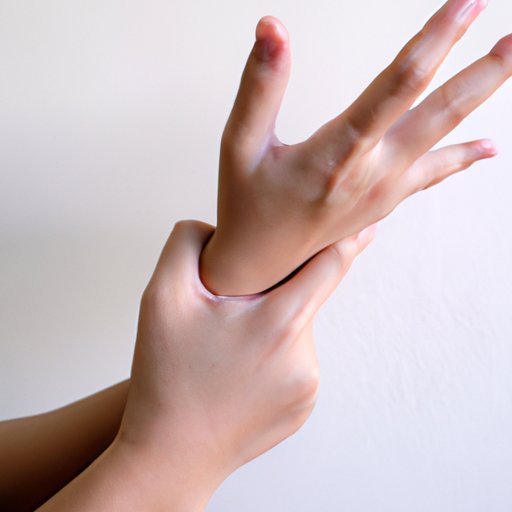I. Introduction
Have you ever been working on a project or exercising and felt a sudden, intense pain in your hands? You may be experiencing hand cramps, which can be annoying and uncomfortable. In order to better understand how to prevent and treat hand cramps, it’s important to look at the possible underlying causes and effective home remedies. In this article, we’ll explore why your hands are cramping, what you can do to alleviate the symptoms, and how lifestyle factors can play a role.

II. Causes of Hand Cramps: Exploring the Possible Underlying Conditions
Hand cramps can be caused by a variety of factors, ranging from overuse to underlying medical conditions. Here are some potential reasons why your hands may be cramping:
- Dehydration: When you’re dehydrated, your muscles may be more prone to cramping. Make sure to drink plenty of water throughout the day, especially if you’re exercising or sweating.
- Overuse: Repetitive motions or activities that strain your hands, such as typing, knitting, or playing an instrument, can cause cramps.
- Nerve damage: Conditions that damage your nerves, such as neuropathy or multiple sclerosis, may affect the signals between your brain and muscles, leading to cramps.
- Arthritis: Arthritis can cause swelling and pain in your joints, including those in your hands, which can lead to muscle cramps.
- Carpal Tunnel Syndrome: Carpal tunnel syndrome is a condition that affects the median nerve in your wrist, which can cause numbness, tingling, and muscle cramps in your hands.
III. Home Remedies: Effective Ways to Prevent and Treat Hand Cramping
If you’re experiencing hand cramps, there are several home remedies you can try to alleviate the symptoms. Here are some of the most effective methods:
- Hydration techniques: As previously mentioned, staying hydrated can help prevent muscle cramps. Drinking water and electrolyte-rich fluids, such as sports drinks or coconut water, can also be beneficial.
- Stretching exercises: Stretching your hands and fingers regularly can help prevent cramps. Try clenching your fist and then gently opening your hand, or spreading your fingers apart and holding the stretch.
- Applying heat or cold compress: Depending on the cause of your hand cramps, applying heat or cold can be helpful. A warm compress can increase blood flow to your hands and relax your muscles, while a cold compress can reduce inflammation and numbness.
- Taking supplements: Supplements such as magnesium, potassium, and calcium can help prevent muscle cramps by regulating electrolyte balance and muscle function.
- Acupuncture: Acupuncture has been shown to be effective in reducing muscle cramps, and may be worth considering if you’re looking for a non-invasive treatment option.
IV. The Psychology of Hand Cramps: How Stress and Anxiety can Affect your Body
The mind and body are deeply interconnected, and stress and anxiety can manifest in physical symptoms such as muscle cramps. Here’s how stress and anxiety can affect your hand health:
- Explanation of the mind-body connection: The way you think and feel can impact the physical sensations you experience, including pain and cramping.
- Impact of stress and anxiety on hand health: When you’re stressed or anxious, your body may be in a state of tension, which can lead to muscle cramps and other physical symptoms.
- Managing stress and anxiety to prevent hand cramps: Practicing stress-reduction techniques, such as deep breathing, meditation, or yoga, can help you manage your stress levels and prevent hand cramps.
V. When to Worry about Hand Cramps: Signs that it May Indicate a Serious Condition
While hand cramps are usually harmless and can be treated with home remedies, there are some warning signs that may indicate a more serious condition. Here’s what to look out for:
- Warning signs: If your hand cramps are accompanied by severe pain, swelling, or redness, or if you’re experiencing muscle weakness or loss of sensation, it’s important to seek medical attention.
- Seeking medical attention: If your hand cramps are disrupting your daily activities, or if you’re experiencing other symptoms such as fever or fatigue, you should consult your doctor to rule out any underlying medical conditions.
VI. Hand Cramps and Lifestyle: How Diet and Exercise Affect Hand Health
Healthy lifestyle choices can play a major role in preventing hand cramps. Here are some tips for keeping your hands healthy:
- Importance of a healthy diet: Eating a diet rich in fruits, vegetables, and whole grains can provide your body with the nutrients it needs to maintain muscle function and reduce inflammation.
- Exercises for hand health: Regular exercise, including strength training and flexibility exercises, can help prevent muscle cramps by improving blood flow and reducing tension.
- Avoiding bad habits: Habits such as smoking or excessive alcohol consumption can damage your nerves and worsen muscle cramps.
VII. Getting a Grip on Hand Cramps: Practical Tips for Managing and Minimizing Symptoms
If you’re prone to hand cramps, there are several practical tips you can try to help manage and reduce the symptoms. Here are some of the most effective strategies:
- Importance of self-awareness: Pay attention to your body and notice when your hands may be feeling tense or cramped.
- Tips for preventing hand cramps: Take breaks during repetitive tasks, use ergonomic tools, and adjust your hand position frequently to prevent strain.
- Management techniques for reducing hand cramps: In addition to the home remedies mentioned earlier, you can try massaging your hands or using a hand grip strengthener to relax your muscles.
VIII. Conclusion
In summary, hand cramps can be caused by a variety of factors, including dehydration, overuse, nerve damage, arthritis, and carpal tunnel syndrome. However, there are several effective home remedies that can help prevent and alleviate the symptoms. In addition, lifestyle factors such as diet, exercise, and stress management play a major role in maintaining hand health. By practicing self-awareness and taking care of your hands, you can reduce the likelihood of experiencing hand cramps and other hand-related issues.
